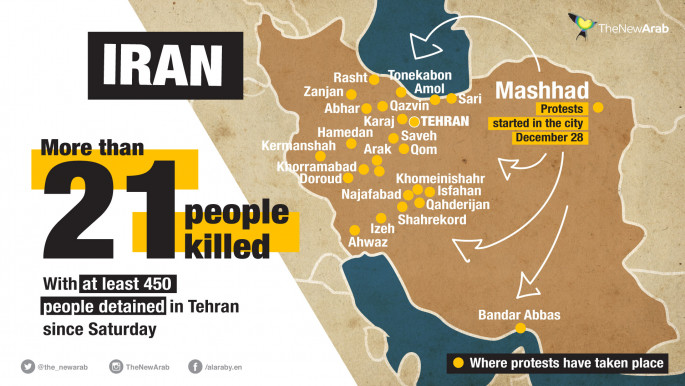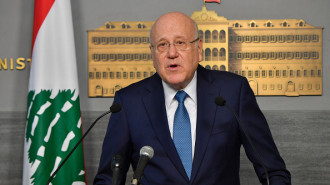Breadcrumb
Iran FM warns neighbouring countries against 'fuelling unrest'
Mohammad Javad Zarif spoke at a security conference in Tehran, and echoed sentiment expressed before by other Iranian officials who blamed the unrest on the United States, Israel and Saudi Arabia.
"Some countries tried to misuse the recent incidents," Zarif said. "No country can create a secure environment for itself at the expense of creating insecurity among its neighbours."
Such efforts will only backfire, the official IRNA news agency reported Zarif as saying.
Protests began in the final days of 2017 in the north-eastern city of Mashhad, with anti-government rallies quickly spreading to other cities including Tehran, Khorramabad, Karaj and Sabzevar.
Thousands are thought to have taken part in the protests, making them the biggest show of public defiance since 2009, when Iranians - as part of the newly-formed Green Movement - took to the streets to denounce alleged rigged presidential elections by then-President Mahmoud Ahmedinejad.
The protests this time were initially centred around rising living costs, but quickly became focused against the regime in general with chants of "Death to the dictator".
Zarif was invited by the European Union for talks to discuss the protests in Iran amid a fierce government crackdown.
A total of 21 people have so far died since protests began and some 450 have been arrested since Saturday, December 30.
Zarif also alluded to the UN security council meeting held on Friday, where the US and Russia clashed over Iran. Nikki Haley, the US ambassador, pushed for the meeting, arguing the unrest could escalate into full-blown conflict, and drawing comparisons with Syria.
"The Iranian regime is now on notice: the world will be watching what you do," Haley warned.
Moscow, while not blocking the meeting, opposed the US push, arguing that the Iranian protests pose no threat to international peace and security.
The session, said Zarif, was a "fiasco", with Trump's administration "isolated at the international level."
The world "witnessed that the other members of the council spoke about preventing the meddling in Iran's internal affairs," he added.
Other Iranian officials have shared Zarif's sentiment. Iran's supreme leader blamed the country's "enemies" for the days of protests saying, "the enemy is always looking for an opportunity and any crevice to infiltrate and strike the Iranian nation."
The foreign ministry in Tehran also lashed out at US President Donald Trump after his latest Twitter attack on the Iranian authorities over the protests, insisting he should focus on "homeless and hungry people" in his own country.
At the start of the protests, Hassan Rouhani, the Iranian president, blamed the unrest on Iran's arch enemies, the United States and Israel.
"Our success in the political arena against the United States and the Zionist regime was unbearable to (Iran's enemies). Iran's success in the region was unbearable to them. Don't you expect that they would seek revenge? Don't you think they would provoke some people?" Rouhani was quoted as saying in a meeting with lawmakers.
Since then, Rouhani has argued against the permanent shut down of social media applications that authorities had blocked at the height of protests in the hope of curbing them.
Telegram, used by nearly half the population, and photo-sharing app Instagram joined Facebook and Twitter in being banned.






![Anthony Blinken speech [Getty] Anthony Blinken speech [Getty]](/sites/default/files/styles/image_684x385/public/media/images/6263436E-8ACD-4D3C-9055-25A7BE79DD5A.jpg?h=d1cb525d&itok=fLHmHCRG)
 Follow the Middle East's top stories in English at The New Arab on Google News
Follow the Middle East's top stories in English at The New Arab on Google News


![Paula Yacoubian was verbally attacked by Salim Aoun during a parliamentary session [Getty]](/sites/default/files/styles/image_330x185/public/1150162486.jpeg?h=b9615360&itok=xysBxMUJ)